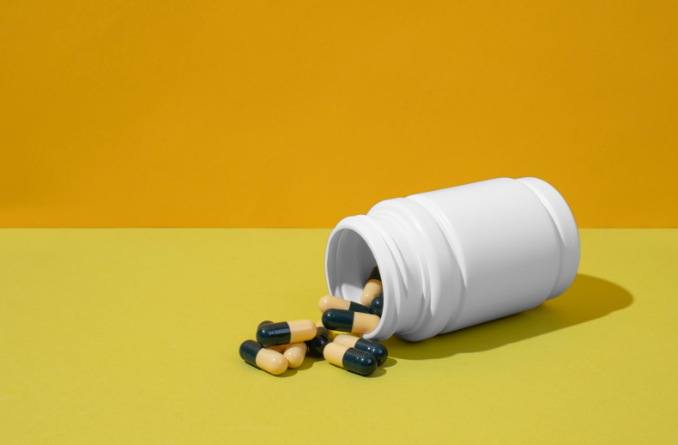7 Best Vitamins For Anemia

Anemia is one of the most common blood conditions. According to the CDC, over 9% of the US population has anemia. And its prevalence is higher in females (13%) than in males (5%).
The problem is that this condition can leave you feeling fatigued and lightheaded, affecting your overall quality of life. The good news is that your diet and supplement choices can play a crucial role in addressing this condition and anemia symptoms.
If you are wondering what vitamins to take for anemia or how to naturally support your body, here we will break down the best 7 vitamins for anemia.
We will explore the best vitamins for anemia, explain their benefits, and discuss how IV therapy may be a more effective option thanks to its efficient absorption rates.
Key Takeaways
- Anemia is often caused by deficiencies in essential nutrients for red blood cell production and iron absorption.
- Vitamins like B12, folate, and C are some of the best vitamins to help combat anemia.
- IV therapy at clinics like Drip Gym in New York provides an effective way to boost your vitamin levels quickly and efficiently.
- A nutrient-rich diet paired with smart supplements can make a huge difference in fighting anemia’s symptoms.
What is Anemia?
Anemia is a health condition when your blood doesn’t have enough healthy red blood cells to carry oxygen throughout the body. This can happen for several reasons, such as iron deficiencies, chronic diseases, or significant blood loss.
Common Causes of Anemia
Symptoms of Anemia
Keep an eye out for these common symptoms of anemia:
- Fatigue
- Dizziness or lightheadedness
- Pale or yellowish skin
- Shortness of breath
- Rapid heartbeat
If these symptoms sound familiar to you, make sure you consult with a healthcare professional to confirm the anemia diagnosis and discuss the best treatment options for you.
Why Vitamins Matter in Anemia Treatment
Vitamins are essential for red blood cell production and the body’s ability to absorb effectively. Without these nutrients, your body struggles to produce healthy blood cells, making it more challenging for the body to receive an adequate oxygen supply, leading to anemia.
A healthy diet, rich in key nutrients, can play a crucial role in restoring red blood cell count. However, sometimes vitamins from food alone may not be enough.
This happens when there is a severe case of anemia or poor vitamin absorption. This is where IV therapy and the right supplementation can provide the best results.
The Best 7 Vitamins for Anemia
If you are asking, “what vitamins should I take for anemia,” here are seven of the most beneficial options.
Vitamin B12
Vitamin B12 is essential for red blood cell production and neurological function. A deficiency in this vitamin may lead to megaloblastic anemia, a condition where red blood cells are larger than normal and not formed properly.
Include foods rich in vitamin B12, such as eggs, dairy products, fish, and fortified cereals. However, people following a vegetarian diet (or vegans) or people with pernicious anemia may have difficulty absorbing B12 from food.
In this case, supplementation of vitamin B12 injections may be a better solution to keep optimal levels of vitamin B12.
Folate (Vitamin B9)
Folate, also known as vitamin B9, plays an important role in cell growth and the formation of DNA. That is why it’s an important nutrient during periods of rapid growth, like pregnancy and infancy. Additionally, this vitamin is essential for red blood cell production and proper brain function.
Natural food sources rich in folate include leafy green vegetables, citrus fruits, beans, and whole grains.
However, some people may have difficulty getting enough folate through diet alone. For example, people with certain genetic conditions like MTHFR mutations which can affect folate metabolism.
Folate deficiency can not only lead to anemia but also a weakened immune system and complications during pregnancy, such as neural tube defects in babies. Supplementing with folic acid (a synthetic form of folate) can be a great option, especially for pregnant women.
Vitamin C
Vitamin C, also known as ascorbic acid, is a powerful antioxidant that helps protect cells from damage caused by free radicals. As a result, it can help enhance the immune function and delay signs of aging.
Additionally, this vitamin is important for collagen production, a protein that is necessary for keeping the skin, cartilage, bones, and blood vessels healthy.
One of the most important roles of vitamin C is its effect in enhancing iron absorption from plant-based foods or oral iron supplements.
Since your body cannot produce or store vitamin C, it’s important you get enough from your diet or supplementation. Natural sources include oranges, strawberries, kiwis, grapefruits, bell peppers, broccoli, and spinach.
For those who require extra support due to dietary restrictions or specific health needs, vitamin supplements or receiving a high dose of vitamin C through IV therapy can be an effective solution to keep adequate vitamin C levels.
Vitamin A
Vitamin A is a crucial nutrient for keeping good eye health, supporting immune function, and promoting healthy skin. It is also important in cell growth and differentiation, making it an important player in maintaining proper function in all the tissues and organs throughout the body.
Rich sources of vitamin A include sweet potatoes, carrots, kale, and liver. For those struggling to include enough of these foods into their diet or have specific health concerns, supplementation with vitamin A may be the best option.
Vitamin K
Vitamin K is important for blood clotting and bone health, making it important for keeping a balanced and strong body. It also helps activate proteins that are necessary for blood coagulation, preventing excessive bleeding after injuries.
This vitamin is naturally found in leafy greens like spinach, kale, and broccoli. You can also include it in fermented foods and animal-based products like cheese and eggs.
Vitamin E
Vitamin E is a powerful antioxidant that helps protect your cells from damage caused by free radicals. It also contributes significantly to maintaining healthy skin, eyes, and a strong immune system.
Additionally, it also plays an important role in cardiovascular health and helps prevent oxidative stress. If you want to boost your vitamin E levels, you can find it in nuts, seeds, leafy greens, and vegetable oils.
Vitamin D
Vitamins D, or the sunshine vitamin, is crucial for maintaining good bone health by helping in calcium absorption. It also supports immune function, promotes a positive mood, and may help reduce the risk of chronic diseases such as diabetes and heart disease.
A deficiency in vitamin D can lead to fatigue, weakened immune function, and even bone-related conditions like osteoporosis.
To keep your vitamin D levels in adequate levels, try taking 10-15 minutes of daily sunlight since your skin can naturally produce vitamin D through the skin. In winter, focus on vitamin D foods like egg yolk, salmon, or fortified vitamin D food. And, when it’s not enough consider a vitamin D supplement.
The Role of Iron Supplements in Anemia
Iron plays an important role in reducing anemia since it’s important for the production of hemoglobin, the protein responsible for transporting oxygen in the red blood cells.
When there is not enough iron, the body struggles to produce enough healthy red blood cells, leading to the symptoms of anemia.
Including iron-rich foods in your diet is a way to naturally prevent ot manage anemia. The best iron comes from animal sources like red meat, poultry, and dish. The iron obtained from plant-based sources is not as absorbable but can still help manage anemia.
When foods rich in iron are not enough, oral iron supplements can be an effective option to reduce the risk of iron-deficiency anemia. This can help restore iron levels and restore energy levels, improving your quality of life.
Remember that to get the most out of your oral iron supplements, make sure you pair it with vitamin C to boost its absorption.
Additional Benefits of IV Therapy for Anemia
For those struggling with severe anemia or poor nutrient absorption, IV therapy offers a faster, more effective solution. Here is why it’s the best option:
Final Words
Anemia may feel overwhelming, but with the right combination of vitamins, supplements, and treatments, you can regain your energy and vitality.
So, what vitamins are good for anemia? Focus on the top seven vitamins we mentioned: B12, folate, C, D, A, E, and K.
If you need an extra boost, pair a healthy diet with powerful solutions like IV therapy from Drip Gym to boost your vitamin B12 intake through vitamin B12 injections, get a high-dose of vitamin C, or get a personalized treatment plan to cover your goals and needs.
Give us a call at +1-516-445-7191 to schedule your first IV therapy session and claim your life back!
DISCLAIMER
If you have any medical questions or concerns, please talk to your healthcare provider. The articles on our website are based on information drawn from medical research, societies, and governmental agencies. However, they are not a substitute for professional medical advice, diagnosis, or treatment.
Sources
- Allen, Lindsay H. “Iron Supplements: Scientific Issues Concerning Efficacy and Implications for Research and Programs.” The Journal of Nutrition, vol. 132, no. 4, 1 Apr. 2002, pp. 813S819S, academic.oup.com/jn/article/132/4/813S/4687233, https://doi.org/10.1093/jn/132.4.813s.
- Chaparro, Camila M., and Parminder S. Suchdev. “Anemia Epidemiology, Pathophysiology, and Etiology in Low‐ and Middle‐Income Countries.” Annals of the New York Academy of Sciences, vol. 1450, no. 1, 22 Apr. 2019, pp. 15–31, www.ncbi.nlm.nih.gov/pmc/articles/PMC6697587/, https://doi.org/10.1111/nyas.14092.
- Fishman, S. M., et al. “The Role of Vitamins in the Prevention and Control of Anaemia.” Public Health Nutrition, vol. 3, no. 2, 1 June 2000, pp. 125–150, www.ncbi.nlm.nih.gov/pubmed/10948381, https://doi.org/10.1017/s1368980000000173.
- KARATOPRAK, Cumali, et al. “Could Vitamin K1 Deficiency Be the Problem in Iron Deficiency And/or Anemia in Premenopausal Women?” Bezmialem Science, vol. 10, no. 2, 14 Apr. 2022, pp. 139–143, https://doi.org/10.14235/bas.galenos.2021.5279. Accessed 5 Aug. 2022.
- Safiri, Saeid, et al. “Burden of Anemia and Its Underlying Causes in 204 Countries and Territories, 1990–2019: Results from the Global Burden of Disease Study 2019.” Journal of Hematology & Oncology, vol. 14, no. 1, 4 Nov. 2021, https://doi.org/10.1186/s13045-021-01202-2.
- Smith, Ellen M., and Vin Tangpricha. “Vitamin D and Anemia.” Current Opinion in Endocrinology, Diabetes and Obesity, vol. 22, no. 6, Dec. 2015, pp. 432–438, www.ncbi.nlm.nih.gov/pmc/articles/PMC4659411/, https://doi.org/10.1097/med.0000000000000199.
- Turner, Jake, et al. “Anemia.” National Library of Medicine, StatPearls Publishing, 8 Aug. 2023, www.ncbi.nlm.nih.gov/books/NBK499994/.
- Williams, Anne, et al. Anemia Prevalence: United States, August 2021- August 2023. 6 Nov. 2024, www.cdc.gov/nchs/products/databriefs/db519.htm, https://doi.org/10.15620/cdc/168890.




